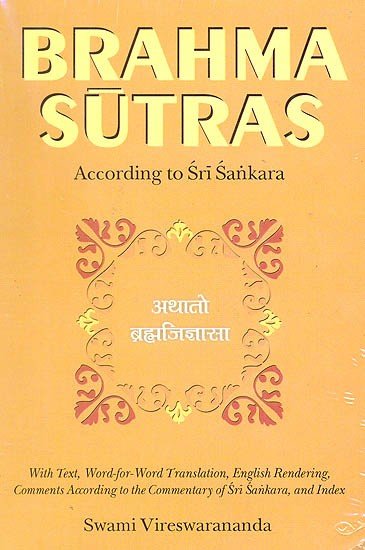Brahma Sutras (Shankara Bhashya)
by Swami Vireshwarananda | 1936 | 124,571 words | ISBN-10: 8175050063
This is the English translation of the Brahma-sutras including the commentary (Bhashya) of Shankara. The Brahma-sutra (or, Vedanta-sutra) is one of the three canonical texts of the Vedanta school of Hindu philosophy and represents an early exposition the Vedantic interpretation of the Upanishads. This edition has the original Sanskrit text, the r...
Chapter III, Section IV, Adhikarana VIII
Adhikarana summary: The duties of the Asrama are to be performed by even one who is not desirous of Knowledge
Sutra 3,4.32
विहितत्वाच्चाश्रमकर्मापि ॥ ३२ ॥
vihitatvāccāśramakarmāpi || 32 ||
vihitatvāt—Because they are enjoined; ca—and; āśrama-karma—duties of the Asrama (order of life); api—also.
32. And; the duties of the Asrama (are to be performed) also (by him who does not desire Liberation), because they are enjoined (on him by the scriptures).
In Sutra 25 it was said that works are a means to Knowledge. The question is raised, since it is so why should one who does not desire Knowledge do these works ? This Sutra says that since these duties are enjoined on all who are in these Asramas or stages of life, viz. student life, householder’s life, and hermit life, one should observe them.
Sutra 3,4.33
सहकारित्वेन च ॥ ३३ ॥
sahakāritvena ca || 33 ||
sahakāritvena—As a means to Knowledge; ca—and.
33. And (the duties are to be performed also) as a means to Knowledge.
Here we have to understand that the duties are helpful in producing Knowledge, but not its fuit, viz. Liberation, which is not attainable except through Knowledge.
Sutra 3,4.34
सर्वथापि त एव, उभयलिङ्गात् ॥ ३४ ॥
sarvathāpi ta eva, ubhayaliṅgāt || 34 ||
sarvathā api—In all cases; te eva—the same duties (have to be performed); ubhaya-liṅgāt—because of the twofold indicatory mark.
34. In all cases the same duties (have to be performed), because of the twofold indicatory mark.
The question is raised whether the work done as enjoined on the Asramas and those done as aids to Knowledge are of two different kinds. This Sutra says that in either case, whether as duties of the Asramas or as aids to Knowledge, the same duties are to be done, as is seen from the Sruti and the Smriti texts.
“The Brahman as seek to know It through the study of the Vedas, sacrifices” etc. (Brih. 4. 4. 22). This text sfyows that sacrifices etc. enjoined in Karmakanda for different purposes are to be performed as means to Knowledge also. The Smriti also says the same thing. “He who performs obligatory work without desire for fruits” etc. (Gita 6, 1). Those very obligatory duties subserve Knowledge also.
Sutra 3,4.35
अनभिभवं च दर्शयति ॥ ३५ ॥
anabhibhavaṃ ca darśayati || 35 ||
anabhibhavaṃ—Not being overpowered; ca—and; darśayati—the scripture shows.
35. And the scripture shows (that one endowed with Brahmacharya) is not overpowered (by anger etc.).
“For that self does not perish which one attains by Brahmacharya” (Chh. 8. 5. 3). This text also shows that like work Brahmacharya etc. are also means to Knowledge. One endowed with it is not overcome by anger, jealousy, etc., and his mind not being disturbed he is able to practise Knowledge.
Therefore works are obligatory on the Asramas and are also means to Knowledge.
